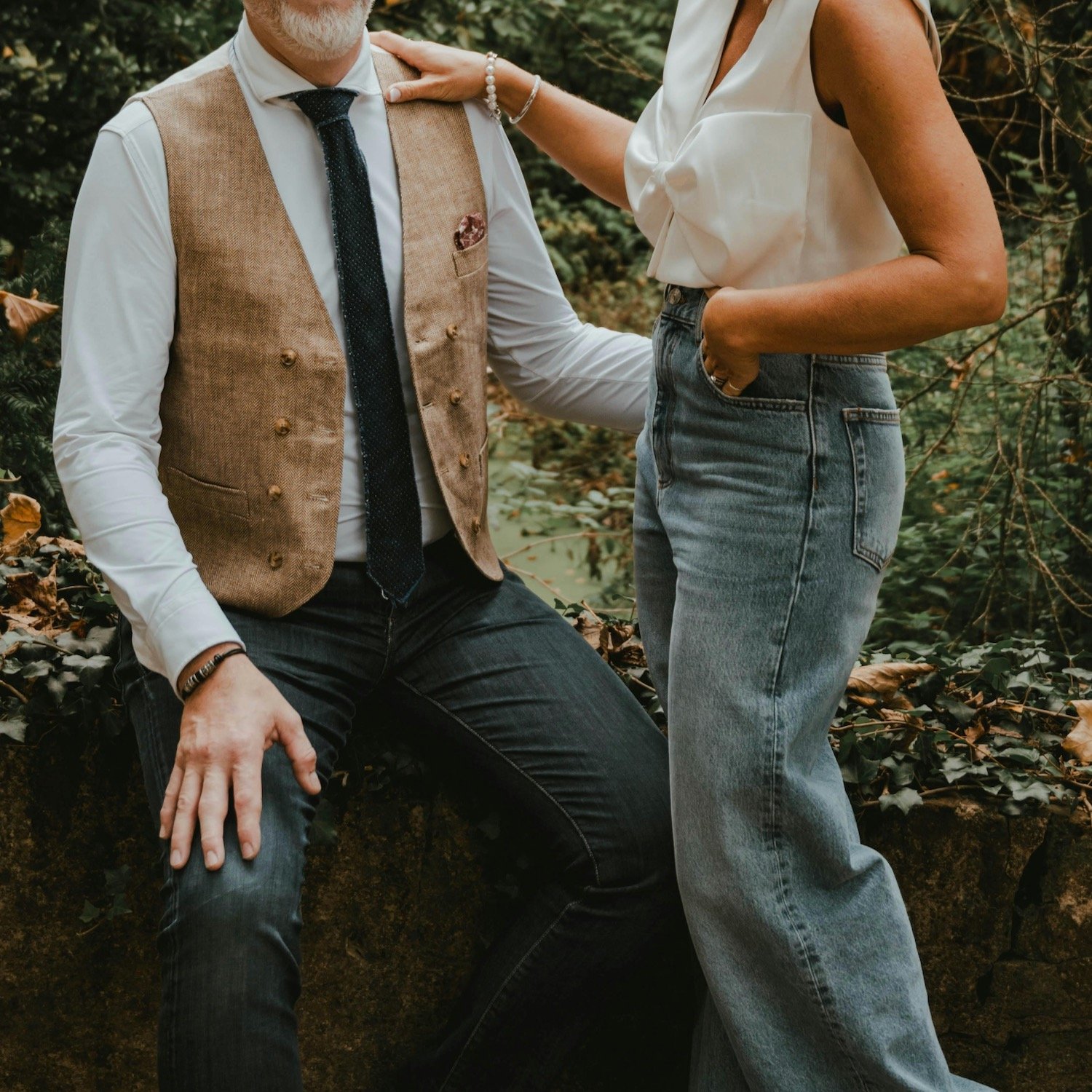If You Still Don't "Get" Boundaries, This One Idea Might Change Everything
by The Candidly Team
Oh look! We’re talking about boundaries again. What a surprise.
If you’re new to this site, then welcome! We’re The Candidly. We’re obsessed with boundaries. We’ve talked about them here, here, here, and here. Whoops, here too.
And though we’ve done deep dives on the subject, spoken to countless experts, and typed out the word “boundaries” more than our own names, the subject can still be, occasionally, deeply confusing.
How do we set boundaries without feeling like terrible people? How do we hold a boundary once it’s set? Are some boundaries just demands we make of others to control their behavior?
Well recently, we came across a few brilliant videos from KC Davis, a licensed therapist, whose unique, refreshing perspective on boundaries sort of made our heads explode. In a good way.
So we asked her 6 questions to find out more.
1. Ok, let's just get into it. What is your specific definition of "boundaries," and how is this unique/different from other experts in your field?
When I hear people talk about boundaries, it’s often in the context of saying something like “you need to set boundaries with that person” or “I set a boundary with my mom and told her not to comment on my weight.” This way of talking about boundaries gives the impression that what we are trying to do is set boundaries on other people’s behavior.
When I talk about boundaries, I’m focusing on recognizing that ultimately only I have agency over my own actions and cannot control others. I define boundaries not as deciding how close you can come, since I cannot control that, but instead as how far am I willing to go.
For my work, I speak about boundaries not as actions, but as an internal understanding of your self-concept. Boundaries are “the place at which I end, and you begin,” and I structure the conversation around learning how we can show up for ourselves in a safe, authentic, and honoring way regardless of the behavior of others.
2. What's the difference between a boundary and a request we make to others on how we'd like to be treated? Why are those requests not boundaries, in your definition?
I often catch some heat for saying that. For example, asking your mother not to talk about your weight isn’t a boundary, but a request. That’s not to say that the other person isn’t doing something wrong or harmful by ignoring it -- but my definition of ‘boundaries’ simply places the emphasis on understanding what you can control. We cannot control if someone honors our requests, and, depending on your own boundaries within that relationship, you’ll decide how much time and effort you are willing to put into explaining or convincing that person why they should honor your request.
Ultimately, you cannot control what they do. The boundary then is what you will do.
In the example of my mom not honoring my request, my boundary may be a range of things including: I do the inner work of not taking on any shame and recognize her comments are her own baggage; I call my mom out every time she brings up my weight; I don’t go out to meals with my mom because she comments on my diet; I block my mom from social media so she can’t comment on my pictures; I talk only on the phone to my mom and don’t see her in person; and I cut my mom out of my life completely. Some of these are internal and some are external. Some are simple and some are extreme. There is no right answer for everyone.
A great real-world example of why these definitions are so important, is one time I had an individual tell me that their partner drew a boundary with them where they were not allowed to speak about how they felt in the relationship. Seriously, that was their boundary. This individual is sitting here and thinking, “Do I have to do this because it’s their boundary?” But it’s not a boundary. It’s just a request. And requests can be reasonable or unreasonable. Calling an unreasonable request a “boundary” doesn’t magically make it a reasonable request. Similarly, calling a reasonable request a boundary doesn’t somehow make an unreasonable person have to honor it.
The whole thing breaks down if boundaries are about telling other people what to do.
You might think, who gets to decide whether a request is reasonable? That’s where boundaries come in. The truth is that each person must decide for themselves. That partner may believe it was a reasonable request, but you know what? As a person with boundaries, I get to go, “Ok there is a point at which they end and I begin, and I acknowledge that they believe this is reasonable. And on my side of this boundary, this is what I think about it and what I think is not reasonable.” You get to do that. In fact, you both do. If you have this disagreement and you are both people with boundaries, the only question left is, “If this is how my partner is going to behave, what am I going to do with that information?” Arguing about what they should think is never going to be empowering, but deciding how you will act in the face of this information is.
3. What do you mean when you say that focusing boundaries on our own behavior is an "actionable and empowering shift"?
Simply put, if we ask someone not to behave in a certain way and they ignore that request, we can either get caught up in trying to make them understand or change – or we can take a step back and say, what is really under my control here? What is my responsibility and what isn’t? Focusing on this keeps the ball in our court.
4. If we're only setting boundaries on our own behavior, though, how do we protect ourselves from behavior we find hurtful, inappropriate, etc?
This is a hard question because it’s very contextual. Each person has different limitations, privileges, values, supports, and capacities.
The truth is there are many scenarios where we can’t protect ourselves fully from being hurt. I think one reason why we become so consumed with boundaries being about others is because we really want to believe that if we could just become good at “holding boundaries,” then we could stop people from hurting us. And while I do think being a ‘boundaried person’ goes a long way in creating more protection and peace in your own life, there is no way to have boundaries that is going to completely protect you from harmful or inappropriate behavior from others.
At the end of the day, relationships are complicated and learning how to show up for yourself isn’t about having peace in your relationships with others – but instead having peace with your relationship to yourself.
5. Do boundaries always have to come with actions and demands? Or can they just be internal guidelines for how we live our lives, or how we decide to emotionally respond to something?
The answer is all of the above. Sometimes I may say to someone, “If this behavior continues, I am unwilling to be in a relationship with you.” And that can be a boundary. Going back to the mother and weight request, while asking my mother to not comment on my weight is a request, asking for what I need in a relationship is a boundary. So regardless of whether my mom honors the request, I am still being boundaried by choosing to speak up and be honest with her about how her behavior affects me. This requires strong boundaries, because I may be afraid of what my mom will feel or say. The truth is not speaking up for myself, in order to manage how my mom feels, isn’t healthy for either of us.
Where I begin is my choice to be honest with my mom. Where I end is her reaction. I’m not responsible for that, provided I have done my best to be kind. So, in terms of how we emotionally respond to something, that’s all about boundaries. One of the hardest boundaries to have is to stop trying to convince people to think you are right when they remain committed to misunderstanding you. Recognizing that the integrity of your decision belongs to you and whether they understand or appreciate it belongs to them is having boundaries.
6. Is it possible for us to use this idea of boundaries to dodge accountability for our own actions, and how they affect others? If someone is angry at us, can we just put up a boundary and say, "well your emotions have nothing to do with me, so therefore I won't take responsibility for the things I did to cause that anger?"
This is another one of those places where I think people get caught up because they really want boundaries to be a referee concept. They want boundaries so be so objective that it can essentially prove who is right and who is wrong in a situation. But that’s just not possible.
For every interaction where a person is doing something harmful and avoiding accountability by saying, “Your feelings aren’t my problem,” there is another interaction where a person has done nothing wrong and the other is saying, “But because I am having these big feelings about it that means you are wrong!” There are no boundary police coming to tell us who is right in every scenario.
A person who is being boundaried seeks to say, “Let me look at my behavior and ask myself if I did the right thing. If I was reasonable, if I could have done something different, and if I have harmed someone.” And they do this not just by themselves but in community. They are seeking the input of other individuals who won’t just be a Yes Man. In this way, they seek to take responsibility of their actions, but not responsibility for the feelings of the other person. But at the end of the day, I cannot force someone else to be boundaried and take responsibility for themselves. I have to decide how to move through the world around them or with them while being true to myself.
KC Davis is a licensed professional therapist, author, and speaker. She is the creator of the mental health platform Struggle Care, where she shares a revolutionary approach to self and home care for those dealing with mental health, physical illness, and hard seasons of life. KC began her mental health journey at sixteen, when she entered treatment for drug addiction and mental health issues. After getting sober, she became a speaker and advocate for mental health and recovery. She lives in Houston with her husband and two daughters. How To Keep House While Drowning [simonandschuster.com] is her first book.
This article is for informational purposes only. It is not intended to be used in place of professional advice, medical treatment, or professional care in any way. This article is not intended to be and should not be a substitute for professional care, advice or treatment. Please consult with your physician or healthcare provider before changing any health regimen. This article is not intended to diagnose, treat, or prevent disease of any kind. Read our Terms & Conditions and Privacy Policy.















